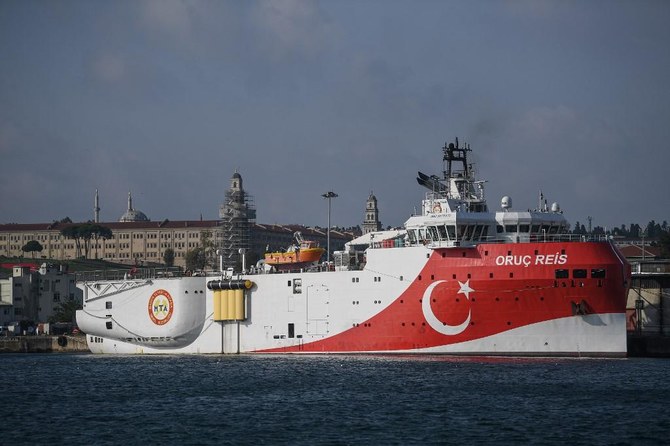ANKARA: Turkey has extending research activities of its Oruc Reis seismic research vessel in the disputed waters of the eastern Mediterranean until Nov. 14.
The move is likely to re-ignite regional tensions after the 7.0 magnitude earthquake that hit Turkey and Greece last week, which was expected to lead to a period of earthquake diplomacy, as happened in 1999.
The new navigational alert (Navtex) issued by Turkey covers sea surveys 16 nautical miles off the Greek island of Rhodes and 50 nautical miles from the island of Kastellorizo.
The Greek Foreign Ministry condemned the Turkish move.
“This action creates further tension in a vulnerable region in which attention is now focused on the provision of assistance and on expressions of support and solidarity,” it said in a press release.
“These actions show once again that Turkey is continuing to act in defiance of the appeals of the international community, including the conclusions of the October meeting of the European Council, which called on Turkey to cease these actions,” it added.
Greek Foreign Minister Nikos Dendias is to inform the country’s allies and partners about the latest developments.
EU leaders agreed on Oct. 2 to give Turkey until early December to reconsider its moves in eastern Mediterranean before considering economic sanctions.
Evangelos D. Kokkinos, an Athens-based geopolitical expert, thinks Turkey issued its Navtex to take advantage Europe’s inability to impose sanctions.
“Most European nations are expected to ‘condemn’ Turkish aggression, but sanctions are out of the question. So, Turkey extending its research activities in the region is another example of ignoring international law and Greek sovereignty,” he told Arab News.
As to what regional tensions it might trigger, Kokkinos thinks that Turkey is already causing serious problems for most of its neighbors, but since both Greece and Turkey are NATO member countries, Turkish President Recep Tayyip Erdogan’s strategy is to provoke Athens into starting a military conflict, so that NATO supports Turkey.
“This is why the tension will remain in what seems like the Mediterranean Cold War,” he said.
According to Seth J. Frantzman, executive director of the Middle East Center for Reporting and Analysis, “the renewal of a provocative Navtex is the latest crisis pushed by Ankara.”
“It had already declared a Navtex in early October. Greece and European countries have condemned the use of these navigational notifications,” he told Arab News.
Frantzman thinks that Turkey uses the Navtex as a way to challenge Greece at sea, which is an abuse of the concept of the Navtex.
“Turkey has done it numerous times in the past several months, shifting from one crisis to another each time. Now Turkey is moving on from having incited against France and Armenia to attacking Greece,” he said, and added:
“It is made even more shameful by the recent earthquake where Greece and others had offered Turkey aid and Ankara’s response is a naval provocation and threat.”
The maritime dispute escalated in August when Turkey first sent its Oruc Reis vessel into waters claimed by Greece and Cyprus. Ankara then withdrew its drilling vessel last month to allow more room for diplomacy ahead of an Oct. 2 European Union summit, where Cyprus and Greece demanded for tough sanctions against Turkey.
Insisting on its rights in the energy-rich Mediterranean region, Turkey dispatched its vessel again on Oct. 12, inciting reaction from the international communit. It sparked concerns about a potential military conflict between the two neighbors who argue over the extent of their continental shelves and claims about regional hydrocarbon resources.
















